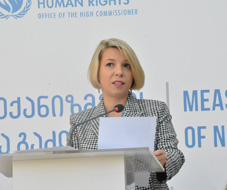10 years of Georgia’s National Preventive Mechanism
By Levan Abramishvili
Thursday, October 17




At the conference, the impact of the NPM was assessed and its strengthening strategies were discussed, in particular, the prevention of torture and ill-treatment in all places of deprivation of liberty.
Representatives of the United Nations and the Council of Europe torture prevention bodies, National Preventive Mechanisms, national human rights institutions, influential international organizations working on torture prevention and independent international specialists discussed the research prepared by the experts on the impact of Georgia's NPM on torture.
Participants shared experiences, explored ways to improve working methods and agreed to respond to identified problems efficiently and sustainably.
Ombudsman Nino Lomjaria spoke in her speech about the importance of NPM and how the situation in Georgian prisons has improved over the last decade.
“In 2009, when the Public Defender of Georgia assumed the function of the National Preventive Mechanism, the overcrowding of penitentiary facilities and the sanitary-hygienic situation there was disturbing. Repressive methods were particularly alarming. Today, the prisoners are treated much better, however, the high interest of the public obliges us to not leave any possible cases of ill-treatment without attention,” said Lomjaria.
She also noted that 10 years is enough time to start thinking about changing the strategy.
“10 years is not a long time, but it’s enough to think about, analyze and evaluate the past. Looking at ourselves with a completely objective eye and seeing our strengths and weaknesses, and if necessary, thinking about a change in strategy,” noted the Ombudsman.
The Public Defender underlined that the success of the NPM is heavily dependent upon the legal instruments in the country.
“It should be noted that the lack of financial and other resources did not affect the independence of the mechanism in general. However, the effectiveness of the NPM largely depends on the legal instruments available in the country. Prevention of torture is first of all ensured by the effective investigation, quality justice and the rule of law,” said the Georgian Public Defender in his speech.
For past decades, the visits to places where people are deprived of their liberty have become generally accepted as one of the most effective ways of preventing torture and ill-treatment.
In this regard, it is of utmost importance to supervise and monitor places of detention with the goal of detecting cases of ill-treatment and providing adequate remedies, undertaken through monitoring systems at the domestic level, in accordance with international instruments.
In June 2005, Georgia ratified The Optional Protocol to the Convention against Torture and other Cruel, Inhuman or Degrading Treatment or Punishment, a treaty that supplements the 1984 United Nations Convention Against Torture.
As part of the assumed obligations, with the amendment of the Organic Law of Georgia on Public Defender, the Office was assigned with the monitoring of the places where people are deprived of liberty. As a result, the NPM team was created within the institutional structure of the Office. Since its establishment, the NPM team has been actively monitoring all places where individuals are detained or placed.
The former Special Rapporteur on torture and other cruel, inhuman or degrading treatment or punishment Manfred Nowak, during his visit to Georgia in 2005 concluded that torture persisted in Georgia, “perpetuated primarily by a culture of impunity.”
During his 2015 visit, The United Nations human rights expert Juan E. Mendez positively assessed Georgia’s openness to the international community and its involvement with human rights experts in trying to improve a wide range of criminal justice issues.
“It is my hope to play a small part in this shift to a more transparent society by having a constructive dialogue with a wide range of stakeholders to assist the Government to identify ongoing challenges that it may have with regards to upholding the rule of law, promoting accountability for torture and ill-treatment, and fulfilling the right of reparations for victims,” stressed the expert.
10 years’ time is short to assess the long-term effectiveness of NPM, however, it is without a doubt that since 2009 the situation in all places of deprivation of liberty across Georgia has improved significantly.
